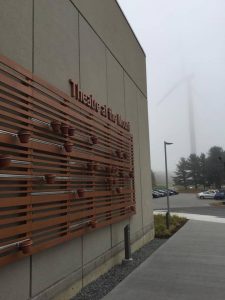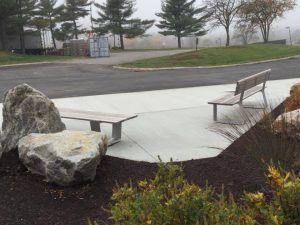By Mariah Boisvert | Observer Contributor
Over the past year MWCC has undergone some major construction with the addition of the new science building and renovations in the main building.







By Mariah Boisvert | Observer Contributor
Over the past year MWCC has undergone some major construction with the addition of the new science building and renovations in the main building.







By Tyler Morgan | Observer Contributor
Hiking a mountain can be a tough obstacle for some, but it is also a way to relieve any stress one may have or even just to clear one’s mind. For Nancy Regan, who works in Health Services on the Gardner campus at Mount Wachusett Community College, this is a way of life. She hikes nearly every weekend and does it year round.
“I love it. For me, it is exhilarating. I consider it a lot of soul-searching that you can do when you’re out in nature and I think it’s great for anyone,” said Regan, who is currently in her third year as the advisor of the MWCC Hiking Club.

Most students at Mount Wachusett Community College may know Aliza Miller as their math professor. She teaches a wide range of levels of math classes. She is a Project ACCCESS (Advancing Community College Careers: Education, Scholarship, and Services) Fellow with the American Mathematical Association of Two-Year Colleges (AMATYC). She posts a Math Problem of the Week on the whiteboard outside her office.
Aside from her work with the math department at The Mount, she is also the Chair of Interdisciplinary Studies at The Mount, has traveled all around the world, and is an artist. Miller has lived in New York, Kaohsiung (in Taiwan), Montreal, Vermont, and here in Massachusetts.
Miller taught English in Kaohsiung through HESS International Educational Group. She came into the country without knowing how to speak Chinese. It was a ‘huge culture shock’ she recalls.
She had to learn to drive a 90cc scooter aggressively through crowded streets. She eventually had to learn some traditional Chinese characters. There were vastly different landscapes within 50 miles of each other. Karaoke was a big deal. After a week of training, she was teaching.
She taught students from the kindergarten level to junior high level. She has kept in touch with some of her former students through social media. One of her students, whose English name is Vivian, is now an aspiring dancer living in London.
What she misses most from Taiwan is the food. It isn’t the karaoke or having to drive aggressively on a 90cc scooter in crowded streets, but the ‘fresh,’ ‘legit,’ food available at almost any hour. She could get fresh food at a night market on her way home from teaching late night classes.
Miller has decorated her current home with artwork featuring origami and geometry. She has a flock of origami cranes following the path of a huge Pythagorean Spiral on one of her walls and a flock traveling along a sine curve on another. She does Bonsai Origami. Her office also has some origami artwork.
Like most professors here at the Mount, Miller is more than what meets the eye in her classes.
By Rebekah Chiasson | Assistant Editor

Democratic operative, Robert Creamer, stepped down from his position at Democracy Partner and Scott Foval was fired on October 18, just two days before the third and final presidential debate, due to the release of an undercover investigative video from James O’Keefe.
O’Keefe’s Veritas Project, a non-profit dedicated to uncovering dishonesty, corruption, waste and fraud in public and private cooperations, released its latest investigative video project claiming illegal activity from the Clinton campaign. MWCC student and Trump supporter, Jack Korman says, “Honestly, I don’t even care about Creamer and Foval, I am more worried that the mainstream media is barely covering it.”
One of the most talked about questions of this election year for Massachusetts is Question 4: Legalization, Regulation, and Taxation of Marijuana. A “yes” vote on this question would, “allow persons 21 and older to possess, use, and transfer marijuana concentrate (including edible products) and to cultivate marijuana, all in limited amounts, and would provide for the regulation and taxation of commercial sale of marijuana and marijuana products.” A “no” vote would keep the laws on marijuana in Massachusetts the same as they are now. So let’s take a deeper look into what the “Regulation and Taxation of Marijuana Act,” the “Marijuana Tax,” and the “Regulation of Use and Distribution of Marijuana NOT Medically Prescribed.”
The Regulation and Taxation of Marijuana Act
The purpose of this act is to control the production and distribution of marijuana. The act works on a system that licenses, regulates, and taxes businesses involved. The system is very similar to that of businesses that deal with Alcohol. It would allow adults over the age of 21 to purchase, and even grow a limited amount of marijuana. The act would have its own advisory board, the “Cannabis Advisory Board.” The board would make recommendations on the regulation of marijuana. The Cannabis Advisory Board would consist of 15 board members assigned by the governor. There would be one expert on marijuana cultivation, one expert in marijuana retailing, one expert in marijuana product manufacturing, one expert in marijuana testing, one board member or officer of a medical marijuana treatment center, one registered medical marijuana patient, one person to represent recreational marijuana consumers, two experts in public health, two experts in law enforcement, two experts in social welfare/justice, and two attorneys with experience with marijuana related cases. Each member will serve a term of two years. The members will not be paid for their work, but they will be reimbursed for expenses they run into while performing advisory board duties.
Marijuana Tax
One of the major arguments in favor of legalization is the potential tax revenue the state would gain. The excise tax for the sale of marijuana and marijuana products would be 3.75% of the total price of the sale. However, on top of that, each city or town has the right to impose its own sales tax on top of that of up to 2%. This collected tax revenue could be used towards things like improving our education system, and the infrastructure around the state.
Regulation of the Use and Distribution of Marijuana NOT Medically Prescribed
In this section, we’ll go over the different regulations, and limitations that will be put into place if legalization is passed. Just like alcohol and guns, marijuana will have its own rules and requirements. These are some of the major limitations: Much like alcohol, it will be illegal to operate any sort or heavy machinery/ motor vehicles under the influence. Also the consumption of marijuana would be illegal on the public or private grounds of any educational facility where grades 1 through 12 are taught, and any negligent conduct would be treated very similarly to that of the current public intoxication laws. A marijuana dispensary will not be permitted to open within 500 feet of a school serving grades K through 12.
As far as regulation goes, here are some of the major points. Marijuana establishments could pay up to $3000 for the application to become a licensed dispensary. If their application is accepted, the license itself will cost the owners another $15,000 to obtain. Dispensaries will be require to have certain security measures as well. This includes actual security guards, specific lighting, video and alarm requirements, and secure storage for the marijuana. There will be random testing of samples of marijuana to ensure that all marijuana is labeled, and advertised correctly. There will be restrictions on the advertising to marijuana to avoid being attractive eto children. There are also a few rules for the personal use of marijuana. An individual may have up to 10 ounces of marijuana in their person residence, but may only purchase 1 ounce at a time.
For more information on the legalization of recreational marijuana, please read the Massachusetts Information for Voters 2016 Ballot Questions booklet that is free, and given to every registered voter.
The Humanities Project at MWCC is in its third year with events that can be attended throughout the year.
The project started in 2014, and is funded by the National Endowment for the Humanities (NEH) to enhance humanities programs at MWCC. The grant is up to $500,000, which is matched 50 cents on every dollar raised.
According to the pamphlets scattered around the building every year, Henry David Thoreau was chosen because he considered himself a scientist and a poet. Last year’s theme was Frankenstein by Mary Shelley, but it didn’t just focus on the book. It also focused on the science of the monster and even psychology. This year’s theme is Imagining Work that shows how artists, writers, and photographers viewed work in the 19th century.
The project’s co-chairs are Professor Michelle Valois, Professor Lorie Donahue, and Professor Susan Blake. The administrator is Dean Laurie Occhipinti. Donahue and Blake referred to Valois as their “fearless leader.”
Every school year, they work hard to come up with a theme that is going to be relevant in other classes, not just humanities and English, but science and maybe even history. The theme is decided by surveys students, faculty, staff, and even the community can take part in. The chosen theme comes with events throughout the semester that students, faculty, and the community can attend, either at MWCC or local libraries.
To raise money for the project, a fundraiser is hosted at Wachusett Mountain where contributors hike the mountain, which raises about $6,000 a year. This will be their third year for this fundraiser to take place. The project has also gotten $240,000 in anonymous donations. The money spent each year has been approximately $8,000.
Professor Blake also wanted to give credit and thanks to the LaChance Library for their help in providing “theme-related materials, creating research guides, and promoting events.”
By Tyler Morgan | Observer Contributor
Traveling across the United States on tour with a popular musician is something not many people can say they have done. The rock star lifestyle is not fit for many, especially with what goes on from day to day while traveling from state to state.
Imagine not being able to take a shower for over a month while being stuck on a luxury tour bus traveling around the U.S having the time of one’s life? For Travis Collier, 21 a graduate of North Middlesex High School in Townsend, the time spent touring was well spent.
By Nicholas Velillari | Observer Contributor

Battlefield 1 is the new first person shooter released by EA and Dice and is the sequel/prequel to Battlefield 4. With most shooters sticking with a futuristic/modern setting, BF1 is going back in time, focusing on World War 1.
The draw to Battlefield games is their multiplayer and in BF1 the multiplayer is the best it’s been since Battlefield 3. At launch, there are six modes to play: Conquest, Rush, Team Deathmatch, Domination, and two new modes called War Pigeons and Operations.
By Rachel Vargeletis | Observer Contributor
Eyes tend to glisten with a certain, familiar
Shine of regret the older one gets.
Wrinkles tend to cast a deeper, darker shadow
Upon their chagrinned pretense
The older one gets.
“Sorry”s feel empty and
“I love you”s only feel like a way of apologizing.
The sun hurts more than is ever brightens your day,
And suddenly,
You find your feet sore from
The routine
Instead of bouncing in eager leaps across each room,
Craving sand under their seasoned edges
And wet dirt between their wriggling toes,
The older one gets.